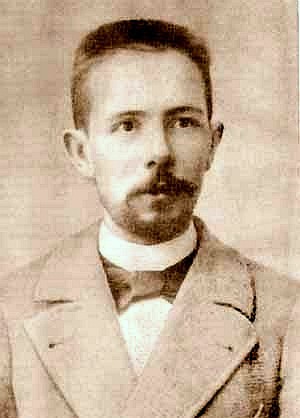|
Here is a not frequently performed on West but beautiful Symphony, unfortunately and unreasonably neglected. A few words about Kalinnikov.
Vasily Sergeyevich Kalinnikov was born in 1866 at Voina, in the Oryol District, where Turgenev, Henry James's "beautiful genius", had been born in 1818. The son of a police official, he was allowed, through the ecclesiastical connections of the family, to study at the seminary in Oryol, where he took charge of the choir at the age of fourteen. In 1884 he went to Moscow as a scholarship student at the Philharmonic Society School, taking lessons on the bassoon and in composition with Alexander Il'yinsky and the self-taught Pavel Blaramberg, a statistician by profession. The poverty of his family which had made it impossible for him to study at the Conservatory forced him to earn a living playing the bassoon, timpani or violin in theatre orchestras and further weakened his health, already affected by childhood privations. He was able to profit, however, from the friendship and teaching of S. N. Kruglikov.

In 1892 Kalinnikov's fortunes seemed about to take a turn for the better, with his appointment, on the recommendation of Tchaikovsky, as conductor at the Malïy Theatre in Moscow and the following year by a similar appointment at the Moscow Italian Theatre, but a few months later his deteriorating health compelled him to resign in order to seek in the relative warmth of the South Crimea a cure for the tuberculosis from which he suffered. He was to remain in Yalta for the rest of his short life, completing there his two symphonies, and, among other instrumental works, incidental music for the play Tsar Boris by Alexey Tolstoy, staged at the Malïy Theatre in 1899.
Kalinnikov's Symphony No. 1 in G minor, written in 1894 and 1895, was first performed at a Russian Music Society concert in Kiev in 1897 under the direction of Vinogradsky. It was dedicated to Kruglikov and is generally regarded as representative of the best of his achievement as a composer, although Rimsky-Korsakov was critical of the work on technical grounds not apparent from the later published score. Its first movement, marked Allegro moderato, has an attractive and lyrical principal theme of obvious Russian character. This is developed in colourful orchestration, with contrasting material related to it and with fugal treatment of the main theme. The slow movement, Andante commodamente, provides an immediate contrast in texture and colour, with orchestration that, as so often with Kalinnikov, suggests Tchaikovsky's skill in the art. A poignant oboe melody emerges, answered by the strings, swelling to a climax before proceeding to a more lyrical section, in which again the woodwind assumes prominence. The plaintive oboe melody is heard again, before the movement ends with the serenity with which it had begun. The following Scherzo, even more Russian in its melodic language, changes the mood of introspection, now a peasant dance, contrasted with the melancholy of the trio section. The final movement opens with a reminiscence of what has passed, before proceeding to a forthright principal theme, to which thematic material from the first movement and new material offer a contrast. The symphony ends in massive and positive triumph.
Towards the end of his life Kalinnikov received some financial relief through the good offices of Sergey Rachmaninov, who had visited him in Yalta and been appalled at the conditions in which he found him living. The latterÕs intervention with the publisher Jurgensen brought an immediate sum of 120 roubles for three songs and an offer to publish the score, parts and piano-duet transcription of the Second Symphony, which had its first performance in Kiev in 1898, a year after the first performance of the First Symphony, which was also heard in Moscow, Vienna and Berlin. Rachmaninov also arranged payment for a piano arrangement of the earlier symphony, but Kalinnikov did not live to benefit from his new agreement with Jurgensen. He died early in January 1901, before his 35th birthday. His death induced Jurgensen to offer Kalinnikov's widow an unexpectedly high sum for the rest of her husband's manuscripts, with the remark that he paid because the composer's death had multiplied the value of his works by ten, a sad reflection on commercial reality…
Here are some selected recordings of the Kalinnikov’s Symphony #1.
Serge Koussevitzky with Boston Symphony in 1936
Fabien Sevitzky with Indianapolis Symphony Orchestra in 1940
Nicolay Golovanov with Bolshoi Orchestra in 1945 (best)
Scherchen with Czech Philharmonic Orchestra in 1951 (best)
Kirill Kondrashin with Moscow Philharmonic Orchestra in 1963
Evgeny Svetlanov with Academic Music Orchestra in 1975 (best) and in 1984
Neeme Järvi with his Scottish National Orchestra in 1987 (best)
Veronika Dudarova with National Symphony Orchestra in 1992 (best)
Alex Feldman with Kaliningrad State Orchestra in 1994
Theodore Kuchar with Ukrainian Radio Orchestra in 1994
Rgs,
Romy the Cat
|